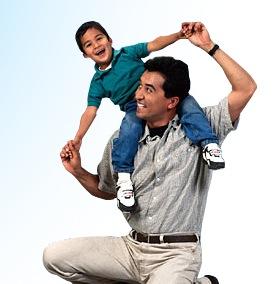(Image of father and son, courtesy of the Center on the Family.)
By Staff Reports
(Oahu)– Family researcher Selva Lewin-Bizan has released the preliminary results of an evaluation of a fatherhood program conducted in Hawai‘i, showing that men who attend the program are likely to improve their parenting skills, knowledge, attitudes and family relationships. Dr. Lewin-Bizan is an assistant professor in the Department of Family and Consumer Sciences and the Center on the Family in the UH Mānoa College of Tropical Agriculture and Human Resources.
The program follows the 24/7 Dad® curriculum created by the National Fatherhood Initiative, which attempts to raise awareness of the importance of fatherhood in the U.S. and to provide tools to fathers that will help them be involved, responsible, and committed twenty four hours a day, seven days a week. The program covers the five characteristics of the 24/7 Dad®: self-awareness, caring for self, fathering skills, parenting skills and relationship skills. The participants meet one evening a week for a period of 12 weeks. Over pizza and soft drinks, they discuss topics such as family history, the meaning of being a man, showing and handling feelings, men’s health, communication, the father’s role, discipline, child development, getting involved, co-parenting and work.
To date, this is the only experimental study focusing on Hawai‘i’s population of fathers, who are extremely diverse ethnically, culturally and economically. Dr. Lewin-Bizan followed different cohorts of fathers – custodial and noncustodial – who participated in the program and provided information about the conditions and capabilities of fathers in the state and over time. These fathers were assessed on their knowledge and skills, involvement, self-perception of the parental role, and additional measures of the quality of the relationship with the child.
Dr. Lewin-Bizan found preliminary evidence that participation in the program improved not only fathers’ pro-fathering knowledge and attitudes but also father involvement, the quality of the father–child relationship, and the quality of the father–mother relationship, as measured by improvements in co-parenting. Moreover, the program also affected fathers’ happiness in being a parent: Fathers reported being happier as a parent after completing the program. However, she cautioned that the results provided so far are preliminary as this is an ongoing study.
Those who would like more information about the study, or would like to attend the 24/7 Dad® program in Hawai‘i at no cost, should contact Dr. Lewin-Bizan at selva@hawaii.edu.

